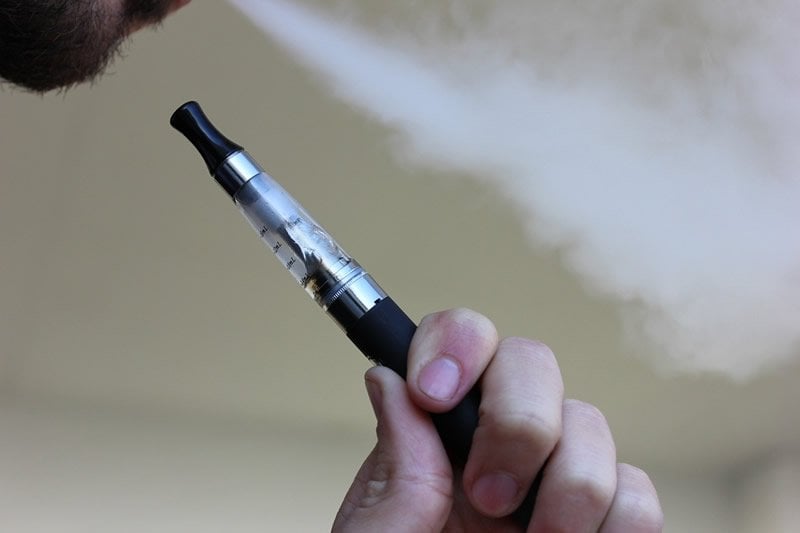Summary: Study strengthens previous findings linking vitamin E acetate to lung injury associated with vaping.
Source: Ohio State University
New research reported in the New England Journal of Medicine by the Centers for Disease Control and Prevention (CDC) in collaboration with The Ohio State University Comprehensive Cancer Center – Arthur G. James Cancer Hospital and Richard J. Solove Research Institute (OSUCCC – James) strengthens prior findings on the link between vitamin E acetate and EVALI (E-cigarette or vaping product use-associated lung injury).
In this new study, the CDC analyzed bronchoalveolar lavage (BAL) fluid from 51 EVALI patients from 16 states and compared it to BAL fluid from 99 healthy individuals. Vitamin E acetate, also found in product samples tested by the Food and Drug Administration (FDA) and state laboratories, was identified in BAL fluid from 48 of 51 EVALI patients but was not found in any BAL fluid from healthy people. No other toxicants were found in BAL fluid from either group, except coconut oil and limonene (one EVALI patient each).
For this study, BAL samples were collected by the CDC from public health laboratories and health departments across the United States. These samples were received from hospital clinical teams that had collected the samples to guide clinical management decisions.
A team of scientists led by Peter Shields, MD, deputy director of the OSUCCC and thoracic oncologist at The James, provided BAL fluid samples from 99 healthy comparison subjects collected between 2015 and 2019 as part of a tobacco product study unrelated to the ongoing CDC investigation of EVALI.
“These findings support the conclusion that vitamin E acetate is a potential causative agent of EVALI, and that is an important discovery as decisions are made about how to best regulate the rapidly evolving e-cig industry,” says Shields, who leads numerous e-cigarette research studies at the OSUCCC – James, including a bronchoscopy study to look at how e-cigarettes impact the lung microenvironment.

In October 2019, Shields and colleagues reported the first evidence that even short-term vaping causes concerning inflammation in the lungs in the medical journal Cancer Prevention Research. Additional data was reported in the medical journal Cancer Epidemiology on Dec. 17, 2019, online ahead of print which finds that the smoking related damage in e-cig users is much less than smokers, and more similar to never-smokers.
Recruitment is ongoing for e-cigarette and tetrahydrocannabinol (THC) vaping studies at the OSUCCC – James. The study protocol recently expanded to include evaluation of THC and marijuana vapors in qualifying participants ages 18 or older. Numerous mechanisms are in place to maintain confidentiality. For more information about this and other tobacco product studies, visit go.osu.edu/tobacco-research or contact 844-744-2447.
Source:
Ohio State University
Media Contacts:
Amanda Harper – Ohio State University
Image Source:
The image is in the public domain.
Original Research: Open access
“Vitamin E Acetate in Bronchoalveolar-Lavage Fluid Associated with EVALI”. Benjamin C. Blount, Ph.D., Mateusz P. Karwowski, M.D., M.P.H., Peter G. Shields, M.D., Maria Morel-Espinosa, Ph.D., Liza Valentin-Blasini, Ph.D., Michael Gardner, M.S., Martha Braselton, B.S., Christina R. Brosius, M.P.H., Kevin T. Caron, B.S., David Chambers, Ph.D., Joseph Corstvet, B.S., Elizabeth Cowan, Ph.D., et al., for the Lung Injury Response Laboratory Working Group*.
New England Journal of Medicine doi:10.1056/NEJMoa1916433.
Abstract
Vitamin E Acetate in Bronchoalveolar-Lavage Fluid Associated with EVALI
BACKGROUND
The causative agents for the current national outbreak of electronic-cigarette, or vaping, product use–associated lung injury (EVALI) have not been established. Detection of toxicants in bronchoalveolar-lavage (BAL) fluid from patients with EVALI can provide direct information on exposure within the lung.
METHODS
BAL fluids were collected from 51 patients with EVALI in 16 states and from 99 healthy participants who were part of an ongoing study of smoking involving nonsmokers, exclusive users of e-cigarettes or vaping products, and exclusive cigarette smokers that was initiated in 2015. Using the BAL fluid, we performed isotope dilution mass spectrometry to measure several priority toxicants: vitamin E acetate, plant oils, medium-chain triglyceride oil, coconut oil, petroleum distillates, and diluent terpenes.
RESULTS
State and local health departments assigned EVALI case status as confirmed for 25 patients and as probable for 26 patients. Vitamin E acetate was identified in BAL fluid obtained from 48 of 51 case patients (94%) in 16 states but not in such fluid obtained from the healthy comparator group. No other priority toxicants were found in BAL fluid from the case patients or the comparator group, except for coconut oil and limonene, which were found in 1 patient each. Among the case patients for whom laboratory or epidemiologic data were available, 47 of 50 (94%) had detectable tetrahydrocannabinol (THC) or its metabolites in BAL fluid or had reported vaping THC products in the 90 days before the onset of illness. Nicotine or its metabolites were detected in 30 of 47 of the case patients (64%).
CONCLUSIONS
Vitamin E acetate was associated with EVALI in a convenience sample of 51 patients in 16 states across the United States. (Funded by the National Cancer Institute and others.)






